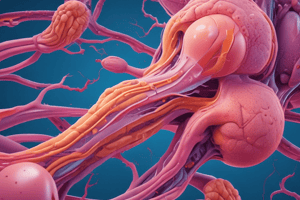Podcast
Questions and Answers
What is the primary function of the testes?
What is the primary function of the testes?
- To facilitate urination
- To store sperm cells
- To secrete seminal fluid
- To produce testosterone (correct)
At what stage of life does sperm production (spermatogenesis) begin?
At what stage of life does sperm production (spermatogenesis) begin?
- At birth
- During childhood
- At puberty (correct)
- In old age
What is the role of the prostate gland in the male reproductive system?
What is the role of the prostate gland in the male reproductive system?
- To secrete a fluid that helps protect and nourish sperm (correct)
- To store urine before it is expelled from the body
- To regulate the production of testosterone
- To produce sperm cells
Which part of the penis is covered by loose layers of skin?
Which part of the penis is covered by loose layers of skin?
Where are the seminal vesicles located in the male reproductive system?
Where are the seminal vesicles located in the male reproductive system?
What is the primary purpose of the fluid secreted by the prostate gland?
What is the primary purpose of the fluid secreted by the prostate gland?
What is the primary function of the penis?
What is the primary function of the penis?
Which of the following is not a component of the male reproductive system mentioned in the text?
Which of the following is not a component of the male reproductive system mentioned in the text?
What is the main function of the fluid produced by the seminal vesicles?
What is the main function of the fluid produced by the seminal vesicles?
What is the primary role of the epididymides in the male reproductive system?
What is the primary role of the epididymides in the male reproductive system?
Flashcards are hidden until you start studying
Study Notes
Male Reproductive System: Structure and Function
Overview
The male reproductive system consists of several internal and external components that work together to ensure fertility and sexual function. These include the testes, prostate gland, epididymides, vas deferens, urethra, seminal vesicles, and the penis. In this article, we will discuss each component in detail.
Testes
Testes are two kidney-shaped glands located within the scrotum, outside the body. They are responsible for producing sperm cells and the primary male sex hormone, testosterone. These activities combine to ensure successful reproduction.
Prostate Gland
The prostate is a walnut-sized gland situated below the bladder and surrounding the urethra. It secretes a viscous alkaline fluid that makes up part of the seminal fluid. This fluid coats the sperm, helping to protect and nourish them during their journey out of the body.
Sperm Production
Sperm production, known scientifically as spermatogenesis, begins at puberty. It involves a series of cell divisions that result in the formation of mature sperm cells. Throughout their lives, millions of new sperm are continuously produced in the testes.
Penis and Urethra
The penis is the male sex organ, primarily responsible for urination and sexual intercourse. It contains three distinct sections: the root, connected to the wall of the abdomen; the body (shaft); and the glans, the cone-like tip covered by loose layers of skin. The opening of the urethra, which carries both urine and semen, is located near the tip of the glans.
Seminal Vesicles
Seminal vesicles are two small glands located above the prostate gland. They produce a significant portion of the fluid in semen. This fluid supports the nutritive needs of sperm during ejaculation and provides additional fertility benefits.
In summary, the male reproductive system plays a crucial role in sexual function and reproduction. Its components include internal structures like testes, epididymides, vas deferens, prostate, and external structures such as the penis, scrotum, and urethra. All these parts work together to ensure the production, storage, transport, and ejaculation of sperm cells for successful fertilization.
Studying That Suits You
Use AI to generate personalized quizzes and flashcards to suit your learning preferences.




